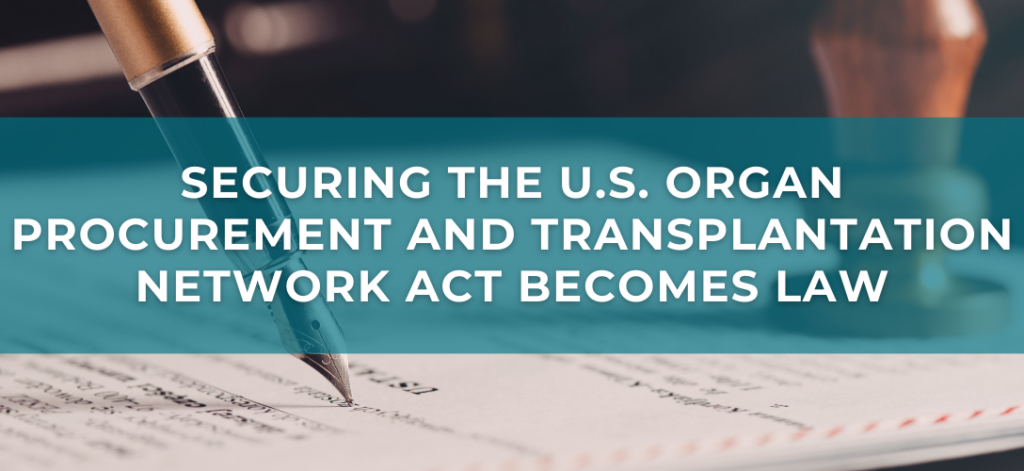
Published on October 3, 2023 | On Friday, September 22, 2023, President Biden signed the Securing the U.S. Organ Procurement and Transplantation Network Act (P.L. 118-140) into law. Through this law, we’ll modernize and improve the Organ Procurement and Transplantation Network (OPTN).
The PKD Foundation was among several kidney care stakeholder organizations that endorsed the bill. Without the help of several elected officials, this historic measure never would’ve reached the president’s desk. Thank you to Representatives Larry Bucshon, M.D. (R-IN-08), Robin Kelly (D-IL-02), and Senators Ben Cardin (D-MD), Todd Young (R-IN), and Bill Cassidy, M.D. (R-LA) for shepherding this reform.
“As dedicated advocates for the PKD Community, the PKD Foundation is pleased to see the passage of the Securing the U.S. Organ Procurement and Transplantation Network Act. We hope to channel this momentum and continue working with our advocacy partners and Congress to make the Living Donors Protection Act law.”
—Susan Bushnell, PKD Foundation President and CEO
Securing the U.S. Organ Procurement and Transplantation Network Act Background
The OPTN is responsible for coordinating and managing the nation’s organ procurement, allocation, and transplantation efforts to increase access to donor organs for patients with end-stage organ failure. Since 1987, only one entity could administer and manage the OPTN— United Network for Organ Sharing (UNOS), a private nonprofit. This was through a contract with the Health Resources and Services Administration (HRSA).
In 2022, The Senate Finance Committee conducted an oversight hearing on UNOS. Following the hearing, they released a report citing areas for improvement in UNOS operations. The report revealed that 70 deaths from 2010 to 2020 were caused by operational failures within OPTN. Additionally, they cited significant areas of improvement pertaining to organ patient safety risks, outdated information technology, testing procedures, and processing. In response, the HRSA announced the Organ Transplantation Network Modernization Initiative earlier this fall, setting off a wave of reform measures that would improve accountability, transparency, equity, and functionality in the OPTN.
As part of a broader effort to improve health outcomes, Congress introduced the Securing the U.S. Organ Procurement and Transplantation Network Act to support the more than 100,000 Americans on the organ transplant waiting list. With the current OPTN contract expires on September 30, which made these proposed changes of imminent importance to the Congress and the HRSA.
What You Need to Know
Firstly, the Securing the U.S. Organ Procurement and Transplantation Network Act ends the current UNOS monopoly by allowing the HRSA to open up bidding on new OPTN contracts by broadening eligibility criteria and the types of awards HRSA can grant to different organizations. This encourages new bidders with specialized expertise to participate, fostering innovation and modernization in the transplant system. Furthermore, the new law removes the $7 million funding limit for those OPTN contracts.
Additionally, the law establishes separate boards for the OPTN and OPTN contractors to promote transparency, accountability and oversight.
Finally, the OPTN contract requires the Government Accountability Office to create a report about the fees paid by users (likely related to organ transplants). This allows Congress to get a clearer picture of how the OPTN is currently funded. Also, the report will provide information on where the money comes from and how it’s used in the OPTN.
Organ Procurement and Transplantation Network Act Impact on the Kidney Community
Each day, 17 people die while waiting for an organ transplant, and of those, 12 are waiting for a kidney.
While we continue leading efforts to find a cure for PKD, transplantation remains the gold standard for treatment. Because of this new law, a more efficient organ procurement process that connects more patients with available organs is possible. By removing unnecessary barriers and increasing transparency and accountability, this law will save lives.
Start making your own impact on the PKD community today. Become a PKD advocate and join the Advocacy Champions Network, apply by October 15.









The uploaded information regarding this act does not explain what the issues were with allocation. For example how are kidneys allocated and who decides?? The average waitlist for a kidney for my blood type is 8 years yet it is mixed in with recipients who will receive a kidney much earlier such as 3 years. This creates a waitlist on the hospital’s website to three years which is not accurate.
Please explain to me how kidneys are allocated, as I mentioned previously?
Awesome article, thanks for this post about Securing the U.S. Organ Procurement.
Get the best commercial office space in Noida
Very nice post.